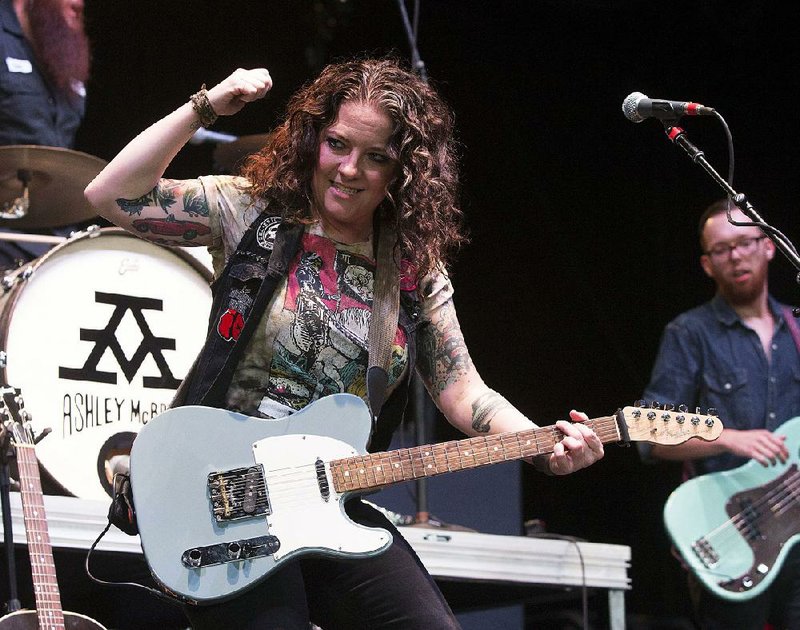For many, the road to success is uncertain and filled with twists, turns and detours.
For Arkansas native Ashley McBryde, the road to success in country music was navigated by a Toyota Tundra* and with a beagle named Banjo.
The 34-year-old from Mammoth Spring finds herself at a career peak. Her major-label debut album, Girl Going Nowhere, was released March 30 and spent its first week at No. 7 on the Billboard Country Music Album chart. In a time when male acts dominate country radio and few females besides Miranda Lambert and Carrie Underwood make financial headway, McBryde’s release can already be considered a significant accomplishment.
To add heat to the spotlight, McBryde’s record is receiving significant attention from national music writers. She was named by Variety as one of Ones to Watch in 2018. Rolling Stone and The New York Times, among other publications, have singled out Girl Going Nowhere for praise.
As befits a girl in northeast Arkansas, McBryde cut her musical teeth on bluegrass festivals.
“Everybody in my family can sing,” she says. “My dad can play guitar and so can my brother. I was the only one in my family who thought of this as something I can do.”
Dedication to her craft came naturally. McBryde attended Arkansas State University to get a degree in musical education, but even while in college she made frequent trips to Memphis to play at coffeehouses and bars. The call to pack up and move to Nashville was stronger than the desire to finish what she’d started in college.
“My degree was going to be in music education,” Mc-Bryde says.
In her early 20s, McBryde enlisted in the army of hopefuls living and working in the country music capital. Supplying songs for the established stars and for newcomers picked by labels to break out is the first rung on Nashville’s long ladder. While the Arkansas singer-songwriter still had her eye on the prize of a career of her own, she knew that songwriting was yet one more way to make connections, an opportunity to get ahead in a town where the competition is beyond fierce.
“You go to [the] recording studio just like going to work,” she says. “You see on the whiteboard who is cutting what [music] on that day and then you try to write songs for those artists. It’s sort of a backward way to create, especially if you are looking at what that person did on their last album. You can’t write what they’ve already done.”
Songwriting was only part of McBryde’s quixotic assault on the music industry. The other part was something the young artist dubbed The Route.
“I mapped out and played what became known to me and my friends as The Route,” McBryde recalls. “I had a 26-day tour where I drove and played in 26 bars — sports bars and biker bars. I’d start in Lexington, Ky., and play in various towns I’d map out along the way. Part of The Route would include Little Rock, Fort Smith and Fayetteville.”
McBryde looks back at this solo musical barnstorming — the musician driving it in her Ford Tundra — with more than a little amazement.
“It was a cool way to live,” she says. “To some it might be a nightmare. A lot of nights you are playing on a stage and there’s a football game on a big screen behind you. You are just the sound in front of the attraction.”
Many nights the singer would play for an attentive crowd — others, not so much.
“There were nights I felt like a jukebox nobody cared about,” she says.
To save money, McBryde would often skip hotels and sleep with friends made before and after the shows. Banjo was by her side and didn’t miss a beat. “Anywhere I laid my jean jacket down, she would lay down.”
Her tip jar was a gas can.
“You know I think [the audiences] might have been reluctant to pay for songs,” Mc-Bryde says. “But they seem to be more willing to pay for your gas money. Everybody has to pay for gas, and so they know what it is like.”
After several years on The Route, McBryde continued to play showcases in Nashville, seeing if someone was willing to give her a leg up on the ladder. Sure enough, she found a management company willing to take her on, and soon after that record, big shots expressed interest — but with reservations not only about her music but also her appearance.
“There’s all kinds of suggestions you get from companies,” McBryde says. “First thing [they’ll say] is lose 25 pounds. ‘What if we put you in a sundress?’ It’s a strange thing that they try to push [new artists] through this mold. I believe there is room for everybody to be making music. All types.”
That McBryde decided to ignore the fussy handlers in Nashville is clear by the cover of Girl Going Nowhere. Behind the wheel of her car, McBryde stares into the camera, her tattoos (another item execs suggested she scrub or hide) prominently displayed.
“My record company and the other people I work with now say they don’t want to change anything [with me],” McBryde says with pride.
It is not lost on her that the whole journey was improbable. The title song and first track of Girl Going Nowhere begins with the lyric “Don’t waste your life on that guitar” and details her numerous naysayers. The song ends with McBryde on a stage in front of an adoring crowd, singing “Not bad for a girl going nowhere.”
At the moment, McBryde’s words couldn’t be more prophetic.
*CORRECTION: Ashley McBryde drove to 26 gigs in a Toyota Tundra. A previous version of this article had the vehicle make wrong.
